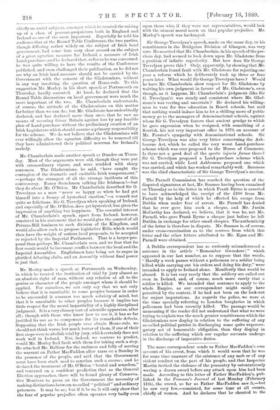Mr. Chamberlain made another speech at Dundee on Thurs- day.
Most of the arguments were old, though they were put with extraordinary vigour, and were studded with sharp sentences. The Gladstonians, he said, " have caught the contagion of the dramatic and excitable Irish temperavient," —perhaps the strangest of all the strange incidents of this controversy. Fancy Scotchmen talking like Irishmen !—but they do about Mr. O'Brien. Mr. Chamberlain described Sir G. Trevelyan as a man " never so happy as when he had got himself into a frenzy of hysterical emotion,"--a remark not quite so felicitous. Sir G. Trevelyan when speaking of Ireland, and especially of Mr. O'Brien, does get hysterical, but gives the impression of anything but happiness. The essential interest of Mr. Chamberlain's speech, apart from Ireland, however, consisted in his statement that he would give the control of all Private-Bill business to each division of the Kingdom, and would also allow each to propose legislative Bills, which would then have the weight of serious local proposals, to be accepted or rejected by the Imperial Parliament. That is a larger pro- posal than perhaps Mr. Chamberlain sees, and we fear that its first result would be incessant conflict between the local and the Imperial Assemblies. Englishmen hate being set to argue in glorified debating clubs, and an Assembly without final power is just that.






































 Previous page
Previous page